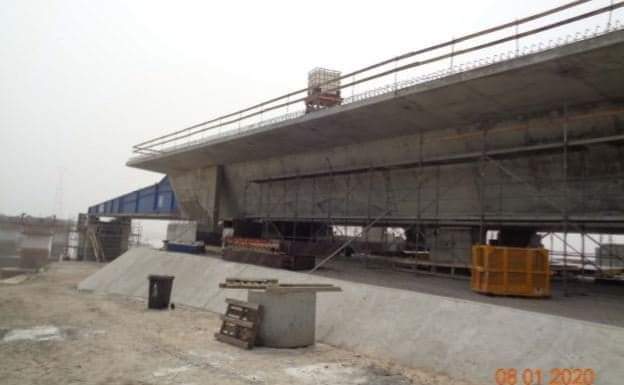—Says committed to Lagos-Abidjan Highway realization
Since Friday last week, analysts were facing issues in placing the level of commitment of the federal government on the Lagos-Abidjan ECOWAS highway considering the fact that the Nigerian end of the scheme is solely funded by the Lagos State government.
In fact, it would be recalled that the state had serious issues, getting federal government approval for the N220b project during the introductory stage of the scheme.
It would be recalled that former Governor Bola Ahmed Tinubu initiated the project amidst stiff opposition by the then federal government and was later pushed with speed during the Babatunde Fashola administration.
Since the emergence of Governor Akinwunmi Ambode, the speed of the project had become unprecedented, according to Business Hilights investigations.
Details from the Lagos State government on the funding of the scheme showed that apart from revenues from taxation, the state had secured some reasonable level of funding from the Chinese bank which further empowered the main contractor, CCECC to deepen delivery of the scheme.
Otherwise, since the beginning of the scheme till date, there has been no commitment of the federal government on the highway.
But only weekend, the Vice President and former Commissioner of Justice in Lagos State during the take off of the scheme, Yemi Osinbajo said the Federal Government is committed to the realisation of the Abidjan-Lagos corridor highway development and its completion on schedule.
Osinbajo disclosed this in his keynote address at the 9th Steering Committee Meeting for the Abidjan-Lagos Corridor Highway development on Friday in Abuja.
In his submission, the Federal Government was excited over the opportunities provided by the project to small businesses, adding that when completed, it would constitute the primary driver of economies of the sub-region.
He averred that the development of the corridor will hopefully set a stage for the formalization of the vast informal economies that exist in and around countries of the region.
Osinbajo noted further that the steering committee meeting was a testimony to the strong relationship existing among ECOWAS countries.
He said “We may live in different countries, speak different languages, spend different currencies but we share a common history, goals and aspirations”.
“The development of the Abidjan-Lagos corridor is one of the flagship projects of the ECOWAS and we believe it will promote regional integration, trade, tourism and other forms of economic activities.
“There is no doubt that connecting West Africa by means of an efficient road network is one of the easiest and most direct ways of boosting local and international economies.”
The vice president said the development of the corridor would also go a long way in resolving hindrances to cross border trading in West Africa.
He commended the commitment of development partners including the African Development Bank, Japan International Corporation Agency (JICA) and other financial institutions to the realization of the project.
Speaking on the matter, the Minister of Power, Works and Housing, Babatunde Fashola, commended the supportive role of the ECOWAS Commission and the African Development Bank toward the delivering the project.
Fashola, who is also the Chairman of the Steering Committee, said the project would promote cross border trade, social and cultural integration as well as enhance prosperity in the sub-region.
He said the committee was moving toward the completion of the preparatory work, adding that Nigeria had ratified the treaty and signed the financing agreement.
Countries to be connected in the Abidjan-Lagos corridor highway development include Nigeria, Ghana, Togo, Benin and Cote D’Ivoire.
However, efforts to get clarifications from the Lagos State government on whether the federal government has taken over the scheme failed as at press time.
Besides, none of the federal officials including Fashola and the Vice president, made any reference to the ongoing construction of the Lagos-Badagry highway which is the beginning of the Abidjan-Lagos corridor highway.









